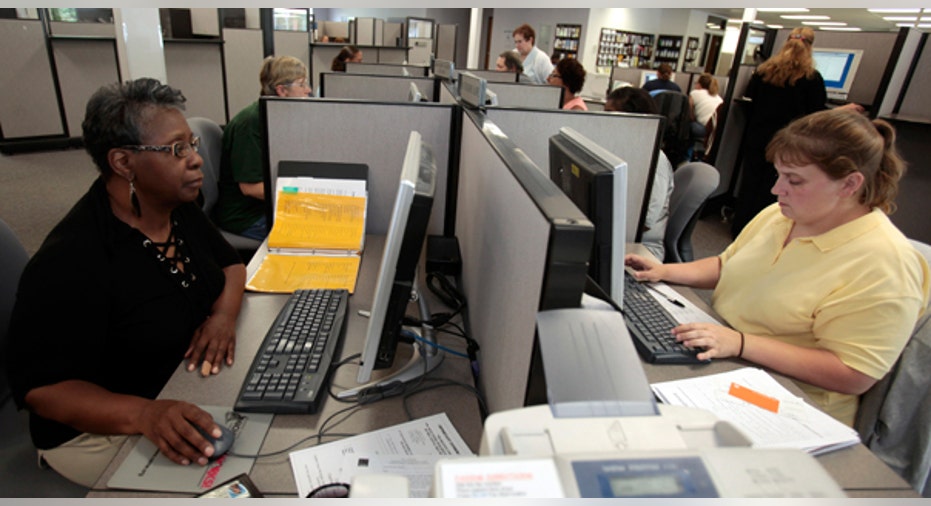Employers have the Upper Hand as Wage Growth Stays Static

The number of people still out of work is not only weighing on the economy and labor market, it's also hurting income.
With millions out of work, employers are able to be more selective -- and don’t have to raise wages, explains economist Gary Burtless at the Brookings Institute. And, according to the latest numbers from the Bureau of Labor Department, employers seem to be doing just that.
In the last 12 months through February, inflation-adjusted wages rose a mere 1.1%, according to the latest data from the Labor Department.
“Businesses are making record profits but employees don’t have much bargaining power, which is not good for the overall economy,” says Burtless. “Workers showing courage and faith that they could quit if they’re dissatisfied puts pressure on employers to increase wages -- but that’s not going to happen anytime soon.”
With a few exceptions when income ticked up slightly, wages have been falling for the last 30 years -- and were broadly flat leading up to the Great Recession in 2008. But with more than 8 million jobs lost in the U.S. since then, workers scrambling to find work has only exacerbated the situation.
“Workers’ wages aren’t growing because employers have the upper hand. Unemployment is high, unions and bargaining power have been weakened, and the value of the minimum wage has declined dramatically,” said Lawrence Mishel, an economist and president of the Economic Policy Institute, in an email.
Nicole Woo, director of domestic policy at the Center for Economic and Policy Research, said the problem is cyclical.
“Corporations are sitting on record levels of cash, but employers continue to hold back on hiring,” she says. “So millions are still looking for work but the demand is not there -- and that affects consumer spending, which makes up around 70% of the economy, and continues to keep the economy down.”
She adds the government is also responsible.
“They need to stop cutting public-sector jobs like nurses, teachers and cops. They continue to cut -- and federal workers have been seeing wage freezes. This is not helping.”
This is all happening as productivity in the U.S. is at an all-time high.
“Productivity grew rapidly at the end of the recession,” says Burtless. “It’s been rising faster than the rest of the industrialized world, but the numbers don’t correlate. Workers real earnings are up 1-2% but productivity is up 7-8%.”
The answer to fixing stuck wages depends on who you talk to.
Woo points out that President Obama’s push to increase the minimum wage from $7.25 to $10.10 will increase wealth and therefore help the overall economy.
“Right now, a full-time minimum wage worker working 40 hours a week, 50 weeks out of the year, makes around $15,000 a year,” she says. “If these low-wage workers were paid a little more, it wouldn’t just help the economy. There would probably be less turnover which costs employers money too.”
The Congressional Budget Office recently reported that the minimum wage hike would raise wages for 16.5 million Americans and lift 900,000 out of poverty -- but that 500,000 jobs would be lost from a minimum wage hike. Woo said that number is high and pointed to a recent Goldman Sachs report that backs up her assertion that fewer jobs would be lost.
“Most people wouldn’t be permanently losing their jobs,” says Woo. “There would just be more time in between jobs -- and with a higher wage when they are working, the minimum-wage employee would still come out ahead.”
Economist Peter Morici strongly disagrees on the positive economic effects of a higher minimum wage.
In a story he wrote for Fox News last week, he said, "Fixing petroleum policy and encouraging Americans to engage in just a little more conservation would eliminate the 5 million barrels a day of oil the United States still imports. If America did that, and confronted China and other currency cheaters over protectionism, the economy could easily cut the ranks of the jobless in half and drive the unemployment rate to 4 percent. That would put a lot of upward pressure on wages—especially in the lower and middle ranks of the labor force and mitigate income inequality.”
Burtless says that while there are some adverse effects, he is in favor of the minimum wage increase.
“It increases people’s wealth and raises the family’s income from the bottom up. It puts pressures on employers -- and the economy develops a bigger appetite for risk, which leads to a lot more optimism.”



















